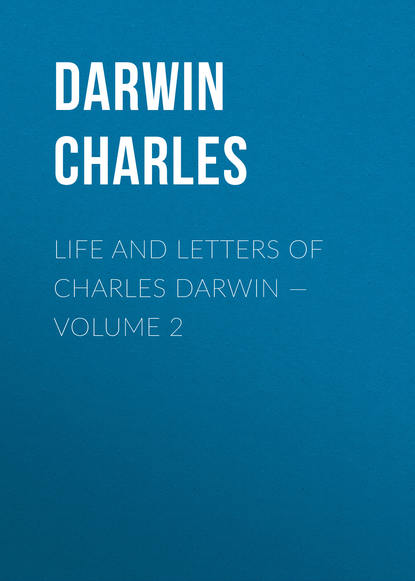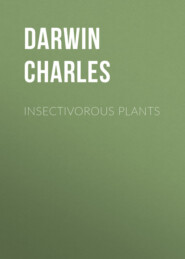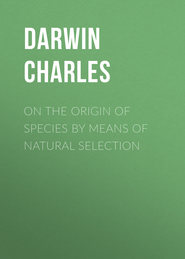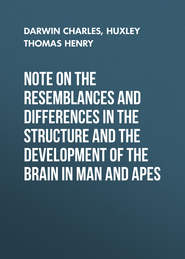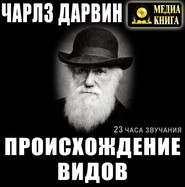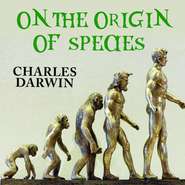По всем вопросам обращайтесь на: info@litportal.ru
(©) 2003-2024.
✖
Life and Letters of Charles Darwin — Volume 2
Настройки чтения
Размер шрифта
Высота строк
Поля
Yours affectionately, C. DARWIN.
P.S. — I send a letter by Herbert Spencer, which you can read or not as you think fit. He puts, to my mind, the philosophy of the argument better than almost any one, at the close of the letter. I could make nothing of Dana's idealistic notions about species; but then, as Wollaston says, I have not a metaphysical head.
By the way, I have thrown at Wollaston's head, a paper by Alexander Jordan, who demonstrates metaphysically that all our cultivated races are Go-created species.
Wollaston misrepresents accidentally, to a wonderful extent, some passages in my book. He reviewed, without relooking at certain passages.
CHARLES DARWIN TO C. LYELL. Down, February 25th [1860].
... I cannot help wondering at your zeal about my book. I declare to heaven you seem to care as much about my book as I do myself. You have no right to be so eminently unselfish! I have taken off my spit [i.e. file] a letter of Ramsay's, as every geologist convert I think very important. By the way, I saw some time ago a letter from H.D. Rogers (Professor of Geology in the University of Glasgow. Born in the United States 1809, died 1866.) to Huxley, in which he goes very far with us...
CHARLES DARWIN TO J.D. HOOKER. Down, Saturday, March 3rd, [1860].
My dear Hooker,
What a day's work you had on that Thursday! I was not able to go to London till Monday, and then I was a fool for going, for, on Tuesday night, I had an attack of fever (with a touch of pleurisy), which came on like a lion, but went off as a lamb, but has shattered me a good bit.
I was much interested by your last note... I think you expect too much in regard to change of opinion on the subject of Species. One large class of men, more especially I suspect of naturalists, never will care about ANY general question, of which old Gray, of the British Museum, may be taken as a type; and secondly, nearly all men past a moderate age, either in actual years or in mind, are, I am fully convinced, incapable of looking at facts under a new point of view. Seriously, I am astonished and rejoiced at the progress which the subject has made; look at the enclosed memorandum. (See table of names below.) — says my book will be forgotten in ten years, perhaps so; but, with such a list, I feel convinced the subject will not. The outsiders, as you say, are strong.
You say that you think that Bentham is touched, "but, like a wise man, holds his tongue." Perhaps you only mean that he cannot decide, otherwise I should think such silence the reverse of magnanimity; for if others behaved the same way, how would opinion ever progress? It is a dereliction of actual duty. (In a subsequent letter to Sir J.D. Hooker (March 12th, 1860), my father wrote, "I now quite understand Bentham's silence.")
I am so glad to hear about Thwaites. (Dr. G.J.K. Thwaites, who was born in 1811, established a reputation in this country as an expert microscopist, and an acute observer, working especially at cryptogamic botany. On his appointment as Director of the Botanic Gardens at Peradenyia, Ceylon, Dr. Thwaites devoted himself to the flora of Ceylon. As a result of this he has left numerous and valuable collections, a description of which he embodied in his 'Enumeratio Plantarum Zeylaniae' (1864). Dr. Thwaites was a fellow of the Linnean Society, but beyond the above facts little seems to have been recorded of his life. His death occurred in Ceylon on September 11th, 1882, in his seventy-second year. "Athenaeum", October 14th, 1882, page 500.)... I have had an astounding letter from Dr. Boott (The letter is enthusiastically laudatory, and obviously full of genuine feeling.); it might be turned into ridicule against him and me, so I will not send it to any one. He writes in a noble spirit of love of truth.
I wonder what Lindley thinks; probably too busy to read or think on the question.
I am vexed about Bentham's reticence, for it would have been of real value to know what parts appeared weakest to a man of his powers of observation.
Farewell, my dear Hooker, yours affectionately, C. DARWIN.
P.S. — Is not Harvey in the class of men who do not at all care for generalities? I remember your saying you could not get him to write on Distribution. I have found his works very unfruitful in every respect.
Joseph Beete Jukes, M.A., F.R.S., 1811-1869. He was educated at Cambridge, and from 1842 to 1846 he acted as naturalist to H.M.S. "Fly", on an exploring expedition in Australia and New Guinea. He was afterwards appointed Director of the Geological Survey of Ireland. He was the author of many papers, and of more than one good hand-book of geology.
Searles Valentine Wood, February 14, 1798-1880. Chiefly known for his work on the Mollusca of the 'Crag.')
[The following letter is of interest in connection with the mention of Mr. Bentham in the last letter:]
G. BENTHAM TO FRANCIS DARWIN. 25 Wilton Place, S.W., May 30th, 1882.
My dear Sir,
In compliance with your note which I received last night, I send herewith the letters I have from your father. I should have done so on seeing the general request published in the papers, but that I did not think there were any among them which could be of any use to you. Highly flattered as I was by the kind and friendly notice with which Mr. Darwin occasionally honoured me, I was never admitted into his intimacy, and he therefore never made any communications to me in relation to his views and labours. I have been throughout one of his most sincere admirers, and fully adopted his theories and conclusions, notwithstanding the severe pain and disappointment they at first occasioned me. On the day that his celebrated paper was read at the Linnean Society, July 1st, 1858, a long paper of mine had been set down for reading, in which, in commenting on the British Flora, I had collected a number of observations and facts illustrating what I then believed to be a fixity in species, however difficult it might be to assign their limits, and showing a tendency of abnormal forms produced by cultivation or otherwise, to withdraw within those original limits when left to themselves. Most fortunately my paper had to give way to Mr. Darwin's and when once that was read, I felt bound to defer mine for reconsideration; I began to entertain doubts on the subject, and on the appearance of the 'Origin of Species,' I was forced, however reluctantly, to give up my long-cherished convictions, the results of much labour and study, and I cancelled all that part of my paper which urged original fixity, and published only portions of the remainder in another form, chiefly in the 'Natural History Review.' I have since acknowledged on various occasions my full adoption of Mr. Darwin's views, and chiefly in my Presidential Address of 1863, and in my thirteenth and last address, issued in the form of a report to the British Association at its meeting at Belfast in 1874.
I prize so highly the letters that I have of Mr. Darwin's, that I should feel obliged by your returning them to me when you have done with them. Unfortunately I have not kept the envelopes, and Mr. Darwin usually only dated them by the month not by the year, so that they are not in any chronological order.
Yours very sincerely, GEORGE BENTHAM.
CHARLES DARWIN TO C. LYELL. Down [March] 12th [1860].
My dear Lyell,
Thinking over what we talked about, the high state of intellectual development of the old Grecians with the little or no subsequent improvement, being an apparent difficulty, it has just occurred to me that in fact the case harmonises perfectly with our views. The case would be a decided difficulty on the Lamarckian or Vestigian doctrine of necessary progression, but on the view which I hold of progression depending on the conditions, it is no objection at all, and harmonises with the other facts of progression in the corporeal structure of other animals. For in a state of anarchy, or despotism, or bad government, or after irruption of barbarians, force, strength, or ferocity, and not intellect, would be apt to gain the day.
We have so enjoyed your and Lady Lyell's visit.
Good-night. C. DARWIN.
P.S. — By an odd chance (for I had not alluded even to the subject) the ladies attacked me this evening, and threw the high state of old Grecians into my teeth, as an unanswerable difficulty, but by good chance I had my answer all pat, and silenced them. Hence I have thought it worth scribbling to you...
CHARLES DARWIN TO J. PRESTWICH. (Now Professor of Geology in the University of Oxford.) Down, March 12th [1860].
... At some future time, when you have a little leisure, and when you have read my 'Origin of Species,' I should esteem it a SINGULAR favour if you would send me any general criticisms. I do not mean of unreasonable length, but such as you could include in a letter. I have always admired your various memoirs so much that I should be eminently glad to receive your opinion, which might be of real service to me.
Pray do not suppose that I expect to CONVERT or PERVERT you; if I could stagger you in ever so slight a degree I should be satisfied; nor fear to annoy me by severe criticisms, for I have had some hearty kicks from some of my best friends. If it would not be disagreeable to you to send me your opinion, I certainly should be truly obliged...
CHARLES DARWIN TO ASA GRAY. Down, April 3rd [1860].
... I remember well the time when the thought of the eye made me cold all over, but I have got over this stage of the complaint, and now small trifling particulars of structure often make me very uncomfortable. The sight of a feather in a peacock's tail, whenever I gaze at it, makes me sick!..
You may like to hear about reviews on my book. Sedgwick (as I and Lyell feel CERTAIN from internal evidence) has reviewed me savagely and unfairly in the "Spectator". (See the quotations which follow the present letter.) The notice includes much abuse, and is hardly fair in several respects. He would actually lead any one, who was ignorant of geology, to suppose that I had invented the great gaps between successive geological formations, instead of its being an almost universally admitted dogma. But my dear old friend Sedgwick, with his noble heart, is old, and is rabid with indignation. It is hard to please every one; you may remember that in my last letter I asked you to leave out about the Weald denudation: I told Jukes this (who is head man of the Irish geological survey), and he blamed me much, for he believed every word of it, and thought it not at all exaggerated! In fact, geologists have no means of gauging the infinitude of past time. There has been one prodigy of a review, namely, an OPPOSED one (by Pictet (Francois Jules Pictet, in the 'Archives des Sciences de la Bibliotheque Universelle,' Mars 1860. The article is written in a courteous and considerate tone, and concludes by saying that the 'Origin' will be of real value to naturalists, especially if they are not led away by its seductive arguments to believe in the dangerous doctrine of modification. A passage which seems to have struck my father as being valuable, and opposite which he has made double pencil marks and written the word "good," is worth quoting: "La theorie de M. Darwin s'accorde mal avec l'histoire des types a formes bien tranchees et definies qui paraissent n'avoir vecu que pendant un temps limite. On en pourrait citer des centaines d'exemples, tel que les reptiles volants, les ichthyosaures, les belemnites, les ammonites, etc." Pictet was born in 1809, died 1872; he was Professor of Anatomy and Zoology at Geneva.), the palaeontologist, in the Bib. Universelle of Geneva) which is PERFECTLY fair and just, and I agree to every word he says; our only difference being that he attaches less weight to arguments in favour, and more to arguments opposed, than I do. Of all the opposed reviews, I think this the only quite fair one, and I never expected to see one. Please observe that I do not class your review by any means as opposed, though you think so yourself! It has done me MUCH too good service ever to appear in that rank in my eyes. But I fear I shall weary you with so much about my book. I should rather think there was a good chance of my becoming the most egotistical man in all Europe! What a proud pre-eminence! Well, you have helped to make me so and therefore you must forgive me if you can.
My dear Gray, ever yours most gratefully, C. DARWIN.
[In a letter to Sir Charles Lyell reference is made to Sedgwick's review in the "Spectator", March 24:
"I now feel certain that Sedgwick is the author of the article in the "Spectator". No one else could use such abusive terms. And what a misrepresentation of my notions! Any ignoramus would suppose that I had FIRST broached the doctrine, that the breaks between successive formations marked long intervals of time. It is very unfair. But poor dear old Sedgwick seems rabid on the question. "Demoralised understanding!" If ever I talk with him I will tell him that I never could believe that an inquisitor could be a good man: but now I know that a man may roast another, and yet have as kind and noble a heart as Sedgwick's."
The following passages are taken from the review:
"I need hardly go on any further with these objections. But I cannot conclude without expressing my detestation of the theory, because of its unflinching materialism; — because it has deserted the inductive track, the only track that leads to physical truth; — because it utterly repudiates final causes, and thereby indicates a demoralised understanding on the part of its advocates."
"Not that I believe that Darwin is an atheist; though I cannot but regard his materialism as atheistical. I think it untrue, because opposed to the obvious course of nature, and the very opposite of inductive truth. And I think it intensely mischievous."
"Each series of facts is laced together by a series of assumptions, and repetitions of the one false principle. You cannot make a good rope out of a string of air bubbles."
"But any startling and (supposed) novel paradox, maintained very boldly and with something of imposing plausibility, produces in some minds a kind of pleasing excitement which predisposes them in its favour; and if they are unused to careful reflection, and averse to the labour of accurate investigation, they will be likely to conclude that what is (apparently) ORIGINAL, must be a production of original GENIUS, and that anything very much opposed to prevailing notions must be a grand DISCOVERY, — in short, that whatever comes from the 'bottom of a well' must be the 'truth' supposed to be hidden there."
In a review in the December number of 'Macmillan's Magazine,' 1860, Fawcett vigorously defended my father from the charge of employing a false method of reasoning; a charge which occurs in Sedgwick's review, and was made at the time ad nauseam, in such phrases as: "This is not the true Baconian method." Fawcett repeated his defence at the meeting of the British Association in 1861. (See an interesting letter from my father in Mr. Stephen's 'Life of Henry Fawcett,' 1886, page 101.)]
CHARLES DARWIN TO W.B CARPENTER. Down, April 6th [1860].
My dear Carpenter,
I have this minute finished your review in the 'Med. Chirurg. Review.' (April 1860.) You must let me express my admiration at this most able essay, and I hope to God it will be largely read, for it must produce a great effect. I ought not, however, to express such warm admiration, for you give my book, I fear, far too much praise. But you have gratified me extremely; and though I hope I do not care very much for the approbation of the non-scientific readers, I cannot say that this is at all so with respect to such few men as yourself. I have not a criticism to make, for I object to not a word; and I admire all, so that I cannot pick out one part as better than the rest. It is all so well balanced. But it is impossible not to be struck with your extent of knowledge in geology, botany, and zoology. The extracts which you give from Hooker seem to me EXCELLENTLY chosen, and most forcible. I am so much pleased in what you say also about Lyell. In fact I am in a fit of enthusiasm, and had better write no more. With cordial thanks,
Yours very sincerely, C. DARWIN.
CHARLES DARWIN TO C. LYELL. Down, April 10th [1860].





